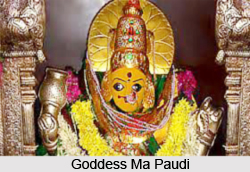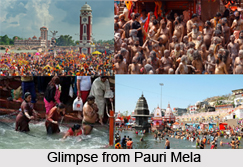 Goddess Ma Paudi has acquired a mysterious halo round her that was the bone of contention between two ruling houses, that of Maharaja of Singhbhum and of the Raja of Seraikella. Ma Paudi is the presiding deity of the Singhbhum district in Chotanagpur. According to the Vamsa Prava Lekhana, Ma Paudi has her origins in Ceylon.
When the deity was installed in the temple at Porahat she became quickly the presiding deity of the area. The main festival in Sri Paudi Devi`s temple is the Sohala Puja or a puja performed with many rites for sixteen days, beginning from Jitua or Jimutavahana Ashtami, in Bhadra, up to the Mahashtami preceding the great Dussehra in Aswin.
Goddess Ma Paudi has acquired a mysterious halo round her that was the bone of contention between two ruling houses, that of Maharaja of Singhbhum and of the Raja of Seraikella. Ma Paudi is the presiding deity of the Singhbhum district in Chotanagpur. According to the Vamsa Prava Lekhana, Ma Paudi has her origins in Ceylon.
When the deity was installed in the temple at Porahat she became quickly the presiding deity of the area. The main festival in Sri Paudi Devi`s temple is the Sohala Puja or a puja performed with many rites for sixteen days, beginning from Jitua or Jimutavahana Ashtami, in Bhadra, up to the Mahashtami preceding the great Dussehra in Aswin.
Ma Paudi had come to Singhbhum, during the reign of Maharaja Kashiram Singh. Seraikella and Kharaswan are Paudi sthans that have been scattered. Ma Paudi has been considered as the symbol of unity. She is annually worshipped once in the month of Jeshtha (May-June) and in Ashadh (June-July). Whenever she is worshipped a clay image of a horse and another of elephant, in miniature form, are purchased from the potters and placed on the spot of worship.
Ma Paudi is also worshipped at Pauri Mela near the town of Seraikella. Here once a year, all the lease-holders of the State assemble with sacrificial animals and rice which they offer to the Goddess and partake of it at the place. This is the festival of Nabanna Bhajan or the Nua-khia Jantal when, on a fixed date after the Sukla Chaturthi of the month of Bhadra each year, the product of the new harvest is offered first to Ma Paudi at Pauri Mel near Seraikella. This is followed by all castes. The Nua-khia Jantal at Seraikella is followed by similar jantals in other Paudi-sthans throughout Seraikella, Singhbhum, which is at times described as land of Ma Paudi. These ceremonies promote the cultural unity of lands of Sri Paudi.
 There is another jantal on the Jeshtka Sukla Chaturthi-the day Sri Paudi Devi was installed at Porahat during the reign of Achutya Singh I in the 13th century A.D. and also installed at Seraikella much later which is the birthday of Ma Paudi. This jantal is performed in Seraikella when all tenants and lease-holders bring their sacrifices to the Sri Paudi temple. Similar jantals also take place in other Paudi-sthans. The above mentioned festivities are the routine annual festivities in the name and honour of Sri Paudi. Once in every ten years there is a national gathering at Paudi Mela, just outside Seraikella Town, in the Singhbhum Pir of Seraikella. It is like a miniature Kumbha Mela and is known by the name of Dasandi or Decidennial, Jantal or Paudi-Mela, which means national unity in the name of Ma Paudi. People are not supposed to go out of the prescribed area formed by two streamlets and the river Kharkai, but must cook their food within that space when the jantal is over. There is no distinction of caste or creed here.
There is another jantal on the Jeshtka Sukla Chaturthi-the day Sri Paudi Devi was installed at Porahat during the reign of Achutya Singh I in the 13th century A.D. and also installed at Seraikella much later which is the birthday of Ma Paudi. This jantal is performed in Seraikella when all tenants and lease-holders bring their sacrifices to the Sri Paudi temple. Similar jantals also take place in other Paudi-sthans. The above mentioned festivities are the routine annual festivities in the name and honour of Sri Paudi. Once in every ten years there is a national gathering at Paudi Mela, just outside Seraikella Town, in the Singhbhum Pir of Seraikella. It is like a miniature Kumbha Mela and is known by the name of Dasandi or Decidennial, Jantal or Paudi-Mela, which means national unity in the name of Ma Paudi. People are not supposed to go out of the prescribed area formed by two streamlets and the river Kharkai, but must cook their food within that space when the jantal is over. There is no distinction of caste or creed here.









